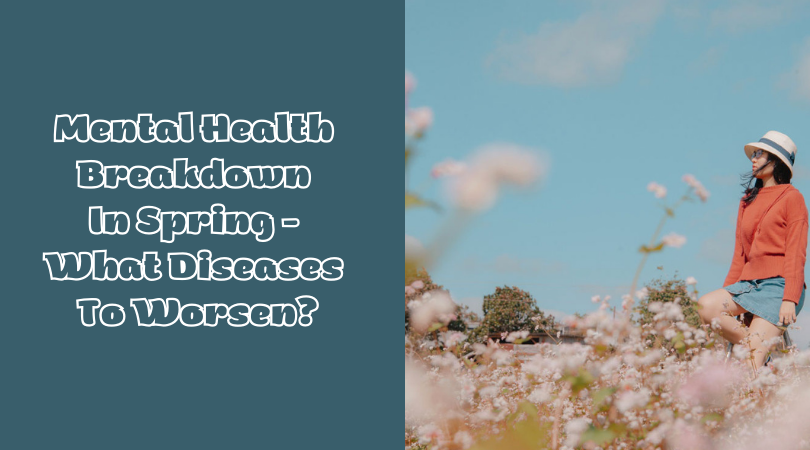 Spring is a period of active awakening of nature after a long winter sleep. Quite often, the air temperature rises sharply or, conversely, falls. Forecasters also note that changes in atmospheric pressure and solar activity are frequent.
Spring is a period of active awakening of nature after a long winter sleep. Quite often, the air temperature rises sharply or, conversely, falls. Forecasters also note that changes in atmospheric pressure and solar activity are frequent.
All this affects the state of human health – diseases associated with the brain vessels appear or worsen. The general state of health worsens, which directly causes mental disorders, overwork, depression, irritability, and regular mood swings. So, is it worth addressing a psychiatrist with the onset of spring, and what specific mental illnesses are exacerbated during the spring season?
Causes of mental illness exacerbation
Exacerbation of mental illness is associated with the following reasons:
- overstrain. According to statistics, in the spring, people begin to plan their financial spending for the year. Their activity at work becomes more active, they have to work two, or even three to four times more than the usual rate. All this leads to overwork, which does not go away even after long-lasting sleep. Often, overstrain at work turns into prolonged depression and stress. And these mental illnesses are already recognized as quite serious reasons for referring to a psychiatrist or psychotherapist.
- poor ecology. Air and water pollution negatively affects not only the physiological, but also the mental health of a person. Scientists have proven that microbes, toxins and heavy metals that enter the body are diligently “eliminated” by the immune system. But in the spring this function is weakened. During the period of changing weather, a person is susceptible to various somatic diseases, including influenza viruses. The body seems to be exhausted when fighting ailments, the nervous system experiences tremendous stress, which can also cause depression and stress.
- general mood in society. The ubiquitous aggressiveness, apathy, fatigue that manifests itself in the people around them, passes on to a particular person. There are signs of fatigue, insomnia, and a nervous state. Mental health at this moment is also deteriorating because the patient tries to solve all of the above problems by drinking alcoholic beverages, taking medications (antidepressants) or other drugs. And this, in turn, also causes an exacerbation of mental illnesses recognized as chronic.
Who is susceptible to worsening mental disease?
According to experts, everyone can survive the difficult spring time. But there is a category of people who are especially susceptible to stress, prolonged depression and serious mental exacerbations. They are:
- pensioners. This category of citizens is characterized by a depleted organism (weakened immunity), which is by all means “used” in the spring by mental illness.
- young people. The hormonal background of young people is unstable. Its frequent change leads to mood swings, apathy, general irritability. Signs of depression and stress appear and develop.
- physically weakened people, whose body lacks vitamins, trace elements, minerals. Therefore, in the spring, it is recommended to give up long and exhausting diets, hunger strikes and other abstinence from full and healthy food.
- specialists whose work is connected with regular communication with people (clients, partners), with control, with management. Spring stress in them is explained by the frequent outburst of emotions, which should not be in normal activities.
Mental illnesses and their exacerbations in spring
Specific mental illnesses are exacerbated in the spring are:
- depression. It is caused by a weak production of certain groups of hormones during the period of changes in the length of the day (vernal equinox), changes in atmospheric pressure and air temperature. Depression is also caused by enormous physical activity, lack of rest and constant employment. It manifests itself in insomnia, decreased sexual activity, constant restlessness, general weakness, lack of appetite. Depression, like many types of stress, can be treated on an outpatient basis, but under the mandatory supervision of a doctor. Otherwise, depression can become chronic.
- schizophrenia, neurosis, psychosis, paranoia and other diseases that are recognized as chronic. Treatment of these diseases is carried out in strict accordance with the medical reports of the commission of doctors. Experts will help to survive the exacerbation of mental illness of a chronic nature, therefore, in the spring, patients often address the clinic for prophylaxis.
- exogenous mental disorders caused by alcoholism, drug addiction, drug dependence, intake of toxic substances, severe radiation exposure, craniocerebral trauma and other external factors.
In the spring, it is recommended to stop taking any addictive substances. If possible, you need to get distracted from business, go in for sports, leave the city, visit preventive institutions. Often, these mental disorders serve as a “starting point” in the development of serious physiological diseases.
How to cope with an exacerbation of mental illness?
As far as possible, with the onset of spring, it is recommended to stay longer in the fresh air, to play sports for pleasure, get enough sleep (you need to sleep at least 8 hours daily), undergo a course of fortification and, of course, visit a psychiatrist – psychotherapist. A prophylactic program is selected on an individual basis, as well as the treatment of a diagnosed chronic disease.
And in conclusion, it should only be noted that there is no clear cyclicality in the course of mental illness. Their aggravation depends not only on seasonality, but also on many external factors, including changes in the social, political and economic spheres. Therefore, it is important to diagnose the disorder in time. Then any change in the weather will not harm a person’s well-being.
